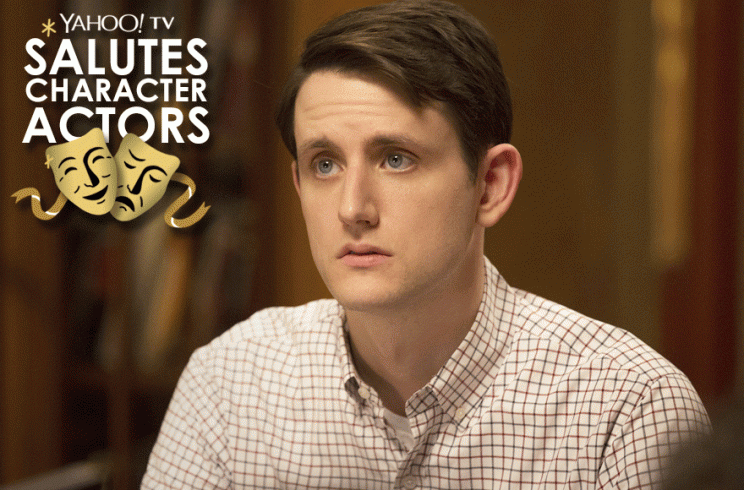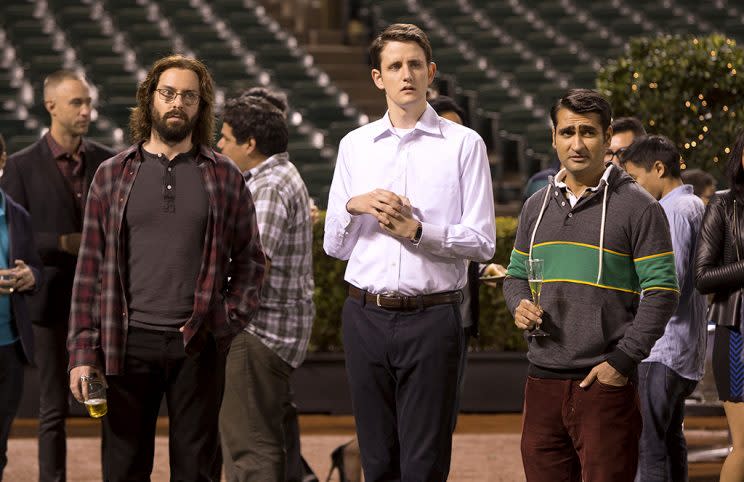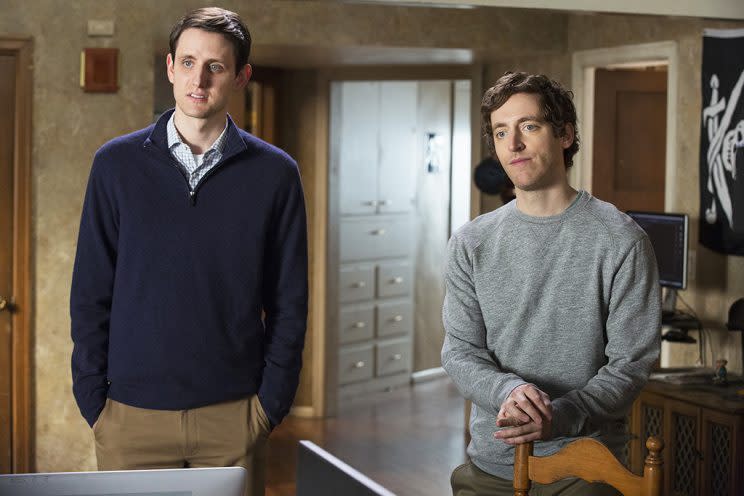How ‘Silicon Valley’ Star Zach Woods Makes Each Character His Own

Successful character actors owe their careers to a number of factors. But Silicon Valley star Zach Woods tells Yahoo TV that he can trace his gainful employment to one primary source: casting director Allison Jones, who has filled out the ensembles for such beloved comedies as The Good Place and Freaks and Geeks. And as a major Freaks and Geeks geek, Woods already knew of Jones’s importance in helping bring that show’s cast together. So when the New Jersey-born, Upright Citizens Brigade-trained actor landed his first major role in Veep creator Armando Iannucci’s 2009 political satire In the Loop, his one wish was for the film to somehow find its way onto Jones’s stack of tapes. “I remember thinking, ‘What if she saw this film, liked me, and it led to other work?’ And that literally happened!”
Not long after In the Loop‘s release, Woods met with Jones, who encouraged him to move out to Los Angeles despite his lack of housing or employment. “She was my Los Angeles guardian angel,” he says now. “She said outright, ‘I’m going to help you.’ I owe a lot to that woman.”

Not only did Jones allow Woods to crash at an empty condo she owned for minimal rent, but she also arranged for him to join the cast of NBC’s The Office as Gabe Lewis, the towering, socially awkward corporate liaison between Sabre and Dunder Mifflin. And that role did indeed lead to other work, including memorable appearances on Veep, Playing House, and Silicon Valley, where Woods is part of a killer comic ensemble that includes Thomas Middleditch, T.J. Miller, Kumail Nanjiani, and Martin Starr.
Now in its fourth season, HBO’s Silicon Valley follows the constantly rising and falling fortunes of a disruptive tech company, Pied Piper, and its brilliant but hapless creator, Richard Hendricks (Middleditch). Woods plays Jared, who left the lush confines of the show’s Google-like Internet monolith, Hooli, to be part of this quixotic startup. “The way I think about Silicon Valley is that it’s a Pinocchio story for Jared,” Woods explains. “He was Hooli’s puppet, but then Richard came and made him a real boy. The arc of his character, for me, is discovering new parts of humanity.”
In Season 4, for example, Jared will learn all about losing a loved one … not to death, but to unemployment. “Richard leaves the company in the very first episode,” Woods says. “That’s an earthquake for Jared, and as the season goes on Richard has a moral crisis that Jared has a difficult time dealing with.” We spoke with Woods about being a character actor in the comedy world and why he never watched an episode of Friends or Family Matters growing up.

Yahoo TV: In chatting with various character actors for this weeklong tribute, it’s been interesting to hear when their paths to character actor-dom began. When did you realize you were headed in this direction?
Zach Woods: It’s weird, because with my Herculean build, you’d think I’d be action movie material! [Laughs] Strangely, the marketplace has denied my obvious physical prowess. It’s more exciting to me, this idea of getting to play characters that are strange or more like actual people that I know. I sometimes feel like the leading-man parts I see are a generic masculinity, which obviously doesn’t work for me. I’m glad to get to play the weird gargoyles and freaks.
You’re generally cast as a very specific type of character — the looming, awkward guy — but you’ve found ways to hit new notes within each of your roles.
I try to think of each character as its own individual thing. It’s the casting department’s job to put the character into a particular area physically or vocally. They’re going to cast someone who fits those certain specifications, but if I start thinking about my type, that’s just a recipe for a sort of reiterative performance where you’re doing the same thing again and again. I try to think about what each character loves and fears, because even with characters that are externally similar, their interior lives can be really different. For example, with Jared on Silicon Valley, he’s madly, deeply, hopelessly in love with Richard and the company and fears letting them down. And on The Office, Gabe loved the idea of being powerful, and feared reality, basically.
Do you ever express those decisions to the writers and directors on set, or just embed them in your performance?
Sometimes it’s a conversation, but more often than not they just want you to make choices. I also improvise a lot as a way of finding the character, and that’s a good way of having a conversation with the writers. If you’re improvising, even if they don’t end up using it, they can see what’s of interest to you about the character and then incorporate it more heavily into the script. That’s especially true on Silicon Valley; they write a joke you love, so you improvise from that joke and they see your interest in that area. And if it’s interesting to them too, they’ll expand on it. It’s a nice back and forth.

When I spoke with Thomas Middleditch last year, he said the entire Silicon Valley cast loves watching you improvise.
Jesus, that’s so nice! Well, Thomas is a force. Richard is such a cerebral character, but he plays it so physically. His body when he plays that character is totally different from his body in real life. I love that guy, so I’m glad he likes it. You sometimes worry when you’re improvising about whether it’s some kind of masturbatory self-indulgence. So I’m glad that Thomas Middleditch approves, if no one else! [Laughs]
Are there any characters actors you look to for inspiration or guidance in your own career?
I would never compare myself to this person, but a character actor I admire is John Cazale. He played Fredo in The Godfather and was also in The Deer Hunter and Dog Day Afternoon. [Cazale passed away in 1978.] Those are not comedies, but I think he’s so funny in The Godfather when he’s introducing Michael Corleone to Moe Green, and Michael is rude to him. Cazale goes: [imitating Fredo’s voice] “Michael, you do not talk to a man like Moe Green like that!” He’s such a desperate clown, and so sympathetic, you know? I just love Cazale. I have a shirt that’s made up of his face with all five of his movies; each slice of his face is a different movie.
Having worked primarily in comedies, have you noticed a difference in what’s required for creating a character career in that genre versus dramas?
You just have to be wary. You don’t want to turn into a shtick machine, and you don’t want to shrink yourself to a collection of external clichés. That’s the thing to keep an eye on. Someone told me once that comedy is basically made up of archetypes that have existed forever. If you watch successful sitcoms, you can reduce them to the same five archetypes that existed in old Italian plays from the Renaissance. That’s true in a way, but the challenge is to not be a generic archetype — to find some specificity in it. In the comedies I really like, the actors are basically playing it as drama. When you can feel someone working really hard to land a joke, it can be really alienating as an audience member. So I try to play it as though this is real stuff that’s actually happening, and these are just peculiar people as opposed to leaning on the comedy with a capital K.

How do you think your particular approach to comedy would have fared on the more traditional sitcoms of the ’80s and ’90s, when you were growing up?
Not as well! [Laughs] I’m very lucky. I started at the Upright Citizens Brigade theater in New York in the early 2000s, back when it was this tiny black box theater that no one cared about. It used to be a porn theater, so people would periodically show up there thinking there was still porn there. It could not have been less on the grid. As I’ve grown up, though, the theater has spread its tentacles, and now when I go to see mainstream comedies, it’s all people I know and took improv with! This alternative comedy has worked its way into mainstream sitcoms and movies, and that chronology is perfect for me. I don’t think I would have done as well on Everyone Loves Raymond. That show’s funny, but it’s just not my wheelhouse.
What were the shows that defined your comic sensibility early on?
I loved Freaks and Geeks, so working with Martin Starr now is just amazing. And that’s an example of someone who really plays a character with his whole heart. He’s not making fun of [Gilfoyle]; he’s committing to it, and that’s so funny. I also always really loved the British Office, Office Space, and old Christopher Guest movies. The fact that I’ve gotten to do the American Office and work with Mike Judge and Martin on a daily basis is the most incredible and surprising bit of wish-fulfillment. I feel bewildered and delighted by it.
It’s interesting that, even as a kid, you weren’t into mainstream shows like Friends.
Not really! I never saw Friends, and I haven’t seen that much Seinfeld. My parents were really intense about TV and didn’t want us watching it, really. So I missed out. When people talk about that episode of Full House or Family Matters they grew up watching, I really have no idea. I’m like, “Do you want to hear about this old, weird British one act play I was reading when I wasn’t allowed to watch TV? I can also quote Lost in Yonkers!” [Laughs]
Silicon Valley airs Sundays at 10:30 p.m. on HBO.
Read more from Yahoo TV:
? ‘Silicon Valley’ Review: Innovation vs. Integrity, With Laughs
? TV’s Top 20 Character Actors Working Today
? How Hall of Fame Character Actor Stephen Tobolowsky Approaches Each Role

